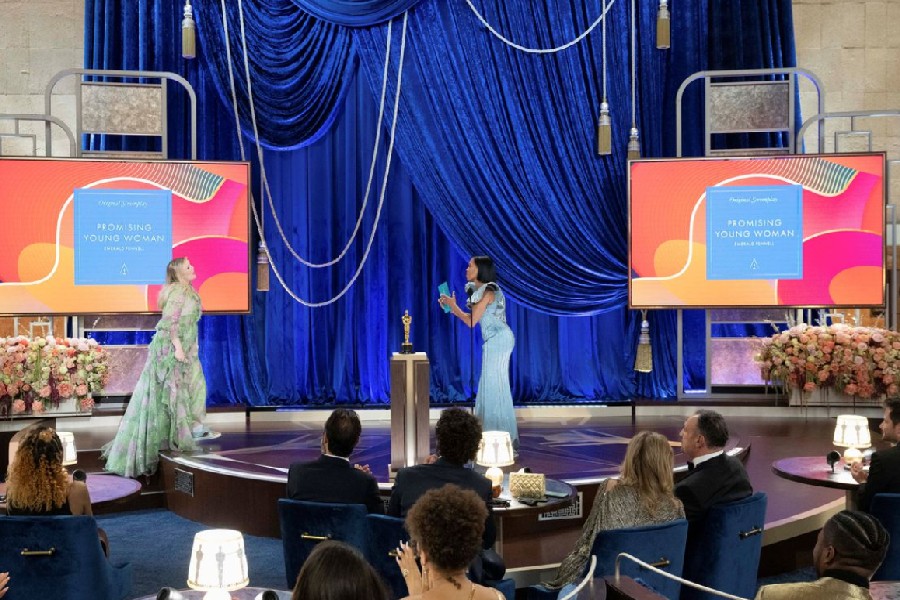The Oscars telecast on Sunday, stripped to its bare essentials by constraints of the COVID-19 pandemic, exhibited a look and feel like no others - devoid of the usual comedy and musical performances but chock full of lengthy oratory from the winners.
As the producers had promised, the 93rd annual Academy Awards ceremony marked a dramatic departure from televised Oscar presentations of the past, with no opening monologue, no live orchestra or any of the glitzy song-and-dance numbers that typically fill the show.
Performances of the five Oscar-nominated best original songs were relegated to pre-recorded presentations broadcast during a two-hour pre-show ahead of the main event on the Disney-owned ABC network, reports Reuters.
What the three-hour broadcast lacked in music was more than made up for in talk, with presenters and winners alike given license to indulge their inner story tellers.
Critics' early reaction was mixed. TVLine's review ran under the headline: "Hollywood's biggest night forgets how to entertain with a sluggish, humorless ceremony." But Deadline Hollywood countered: "Unconventional, intimate ceremony reinvigorates Hollywood's big night and makes history."
The New York Times, saying Oscar producers failed to achieve their stated aim of making the telecast more like a film, described the show as "a cross between the Golden Globes and the closing-night banquet of a long, exhausting convention."
The very setting for Hollywood's highest honors was unlike any before it, a ballroom decorated in a quasi-cabaret style inside Union Station, the ornate but decidedly less conventional venue of a railway pavilion in downtown Los Angeles.
Coronavirus-related travel restrictions and public health measures forced a complete overhaul of the show, limiting attendance to just a few hundred nominees and presenters, some contenders joining the festivities by satellite from international locations.
The show itself opened with a camera following actress Regina King, dressed in a shimmering blue, sequined evening gown, as she strode through the grand hall of the rail station and onto the stage, surrounded by stars and their guests seated at socially distanced tables and booths arrayed around the room.
King, the 2005 best supporting actress winner whose feature directorial debut "One Night in Miami" was nominated for three awards this year, noted that the celebrities in attendance would be seen without face coverings while on camera.
But she said the stars were, nevertheless, adhering to strict COVID-19 safety guidelines that have allowed Hollywood to resume productions in recent months.
"Tonight we are following all the rigorous protocols that got us back safely," she said. "Just like on a movie set, when we are rolling, masks off. And when we’re not rolling, masks on."
Events surrounding the Minneapolis trial of the former policeman convicted of murdering George Floyd, and renewed calls for sustaining the struggle against racial injustice in America, weighed heavily on the Oscars as well.
"If things had gone differently this past week in Minneapolis, I might have traded in my heels for marching boots," King said in an early moment that sought to strike an awkward balance between celebration and social consciousness.
"I know that a lot of you people at home want to reach for your remotes when you feel like Hollywood is preaching to you," King said. "But as the mother of a Black son, I know the fear that so many live with, and no amount of fame or fortune changes that."
While the scaled-back proceedings made for a more subdued and more intimate affair than usual, the evening was not without its lighter moments.
Actor Lil Rel Howery and musician Questlove teamed up to lead a round of Oscar song trivia, ending with veteran actress Glenn Close, nominated this year for her role as an Appalachian grandmother, standing up to shake her backside to a recording of the 1988 funk hit titled "Da Butt."
One of the greatest changes from traditional Oscar presentations during Sunday's telecast was a marked expansion in the length of speeches given by the winners, who normally are "played" off by the orchestra if their thank-yous run past 45 seconds.
Filmmaker Steven Soderbergh, one of three co-producers of this year's event, had encouraged recipients in advance to "tell a story" and personalize their acceptance speeches.
The enlarged oratorical dimension of the show appeared to be welcomed by the star-studded audience at Union Station, but it remained to be seen how it would play at home with television viewers in the Oscar ratings, which have already experienced a steady decline in recent years.


